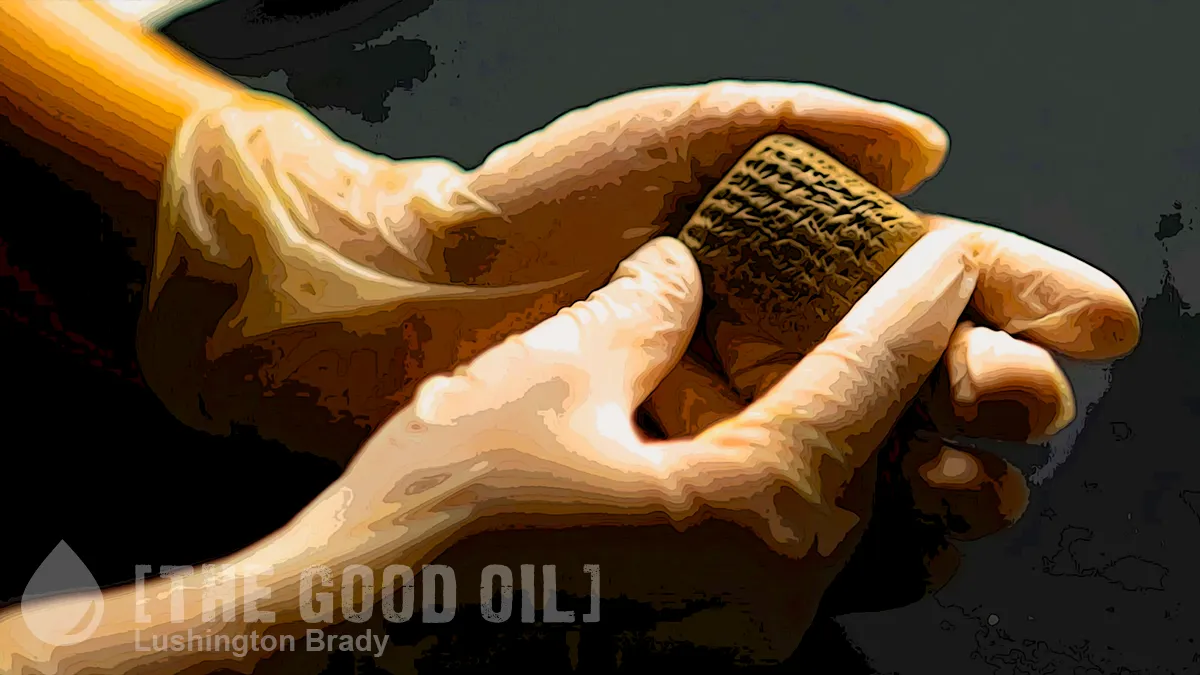Table of Contents
“The past,” Douglas Adams wrote, “really is a foreign country: people do things exactly the same there”. We’re finding the truth of that statement as more and more ancient cuneiform tablets are translated.
Cuneiform is the earliest known writing system, in which a wedge-shaped stylus was used to press patterns into wet clay tablets. Clay being much more durable than, say, papyrus, hundreds of thousands of cuneiform tablets are known to have survived. Beginning in the early 19th century, philologers began to decipher these ancient records.
The sheer number of extant tablets, though, means that, to date, only about five to 10 have ever been translated. A concerted effort, including using AI, is translating more and more.
What they’re finding is a wealth of information, both fascinating and mundane. There’s begging letters from widows to members of their extended families, as well as the world’s oldest customer complaint. Nearly 4,000 years ago, a copper merchant named Nanni wrote to a copper smelter called Ea-Nasir. Suffice to say, Nanni was not happy and he wanted his money back. Nanni complained about the poor quality of the copper ingots his agent was being offered, the rude treatment given to his agent and how he (Nanni) now had neither copper ingots nor his money.
Tell Ea-Nasir: Nanni sends the following message:
When you came, you said to me: “I will give fine quality copper ingots”. You left, but you did not do what you promised me. You put ingots which were not good before my messenger and said: “If you want to take them, take them; if you do not want to take them, go away!”
What do you take me for that you treat me with such contempt? … How have you treated me for that copper?
Nanni finished up by threatening to show up and help himself to replacement ingots and would not be fobbed off with any that were “not of fine quality”.
Another tablet, recently found in Turkey, turned out to be a 3,500 year old furniture receipt. Back in the 15th century BC, someone in what was then part of the Hittite empire bought a set of wooden tables, chairs and stools.
Excavators discovered the tablet during construction work in Reyhanlı, a southern Turkish city near the border with Syria, according to a translated statement by the country’s Ministry of Culture and Tourism.
As Mehmet Ersoy, minister of culture and tourism, says in the statement, the newly discovered tablet sheds light on the economic and state systems of Late Bronze Age Anatolia, the land between the Black and Mediterranean seas that’s now occupied by Turkey. Measuring just over an inch and a half long and weighing less than an ounce, the tablet dates back to the 15th century B.C.E.
The tablet is written in Akkadian, a now-extinct language that was the earliest-known Semitic language. From the eighth century BC it was slowly replaced by languages like Old Aramaic. By the time of Alexander the Great, Akkadian had likely died out as a spoken language. As a written language it was extinct by the first century AD.
Many surviving examples of the practice are – like the recently found tablet – administrative records of sale. Another slightly newer cuneiform tablet in the Met’s collection, dating to about 2039 B.C.E., documents the selling of some sheep, ewes and goats.
Researchers found the tablet in Reyhanlı’s Alalakh archaeological site, which was a flourishing city in the second millennium B.C.E. – the Bronze Age – as Newsweek’s Aristos Georgiou writes. Also known as Tell Atchana, Alalakh was the capital city of the Kingdom of Mukish and the region’s largest settlement, occupied by the Amorite people from western Mesopotamia, per Live Science.
Whether the ancient furniture salesman styled himself as ‘Crazy Temetti’ remains, alas, unknown.









